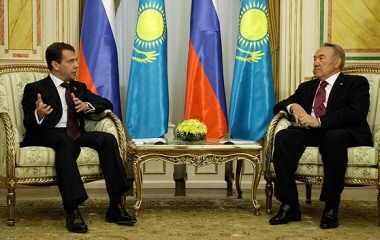A host of nuclear energy bilaterals and agreements have been announced in recent days including documents signed during a visit by President Dmitry Medvedev of Russia to Kazakhstan. Other countries including France, Morocco, Mexico, South Korea, Saudi Arabia, Ukraine and the USA have been working on working together.
 |
| Presidents Medvedev of Russia and Nazarbayev of Khasakstan discuss cooperation (Image: Presidency of Russia) |
Sergey Kiriyenko, director general of Russian state nuclear energy company Rosatom, and Vladimir Shkolnik, president of Kazakh state company Kazatomprom, signed two documents during the presidential visit: a memorandum on integration and cooperation, and a statement on draft central administration for a proposed joint uranium enrichment plant.
The memorandum on integration and cooperation, according to Rosatom, reaffirms the two companies' commitment to work together to create an integrated, multi-tiered joint Russian-Kazakh company which would be able to position itself on the global nuclear fuel market. The second statement is on the draft central administration for plans for Kazakh involvement in a Russia's Ural Electrochemical Plant. Recent reports have suggested that Kazakhstan might be about to take a stake in a Russian enrichment plant.
New group for USA-Ukraine
A group on civil nuclear power cooperation was one of three new commission groups announced by US secretary of state Hillary Clinton and Ukrainian foreign minister Kostatyn Gryschenko during the second session of the US-Ukraine Strategic Partnership Commission, held in Kiev. The group will look at "further possibilities for cooperation in civil nuclear power", as part of efforts to modernise Ukraine's nuclear power industry and diversify its fuel supplies, according to a joint statement released by the Ministry for Foreign Affairs of Ukraine.
Saudi government authorises French accord
The Saudi Arabian cabinet has given the go-ahead for the signature of a draft nuclear cooperation agreement with France. The cabinet decision was announced in a statement carried by the national news agency, SPA, but gave no details of when a signing might take place. Saudi Arabia is one of several Middle Eastern states looking into setting up a nuclear power program, and recently appointed the Finland- and Swiss-based Pöyry consultancy firm to help it to define its strategy for nuclear and renewable energy applications.
France-Morocco
Meanwhile, a cooperation agreement on civil nuclear power was one of ten accords signed at a high-level Franco-Moroccan summit. Other areas of cooperation between the two governments included renewable energies (specifically, solar and wind) and sustainable development. Morocco has tentative plans to build a nuclear power reactor, and signed a nuclear cooperation agreement with France in 2007. The same year, France's Areva signed an agreement with Morocco's Office Cherifien des Phosphates (OCP) to investigate recovery of uranium from Moroccan phosphates.
South Korea to help train Mexican engineers
South Korea has agreed to help train Mexican nuclear professionals at a meeting of ministers from the two countries' energy departments during a state visit to Mexico by South Korean President Lee Myung-bak. According to the Korean Ministry of Knowledge Economy, South Korea will help to Mexico to develop its nuclear workforce as well as working on joint research and development projects. According to the ministry, Korea plans to build a close relationship with Mexico, which already operates two nuclear reactors at Laguna Verde and is looking into the possibility of building more. This sentiment was echoed by the South Korean president in a joint statement issued by the two countries, in which he highlighted nuclear power and nuclear plant construction as areas in which Korea is interested in strengthening bilateral cooperation with Mexico. A more specific cooperation agreement is likely to be drawn up later this year.
JV for Inter RAO and Worley Parsons
Russian energy company Inter RAO, which is 57% owned by Rosatom, has announced it has signed documents establishing a joint venture with Australian engineering company Worley Parsons to work on the transfer of power engineering technology into the Russian market and to promote Inter RAO's projects oversees. Inter RAO will hold 51% of the joint venture, with Worley Parsons holding the remainder.
Researched and written
by World Nuclear News






_15863.jpg)







